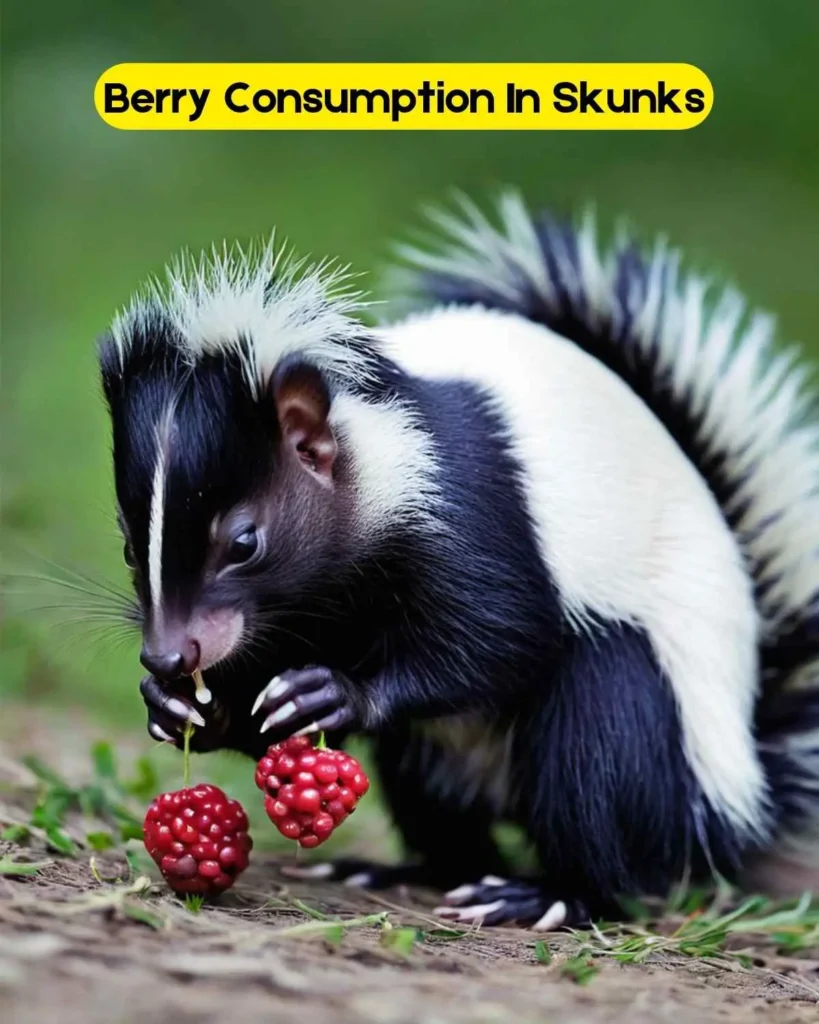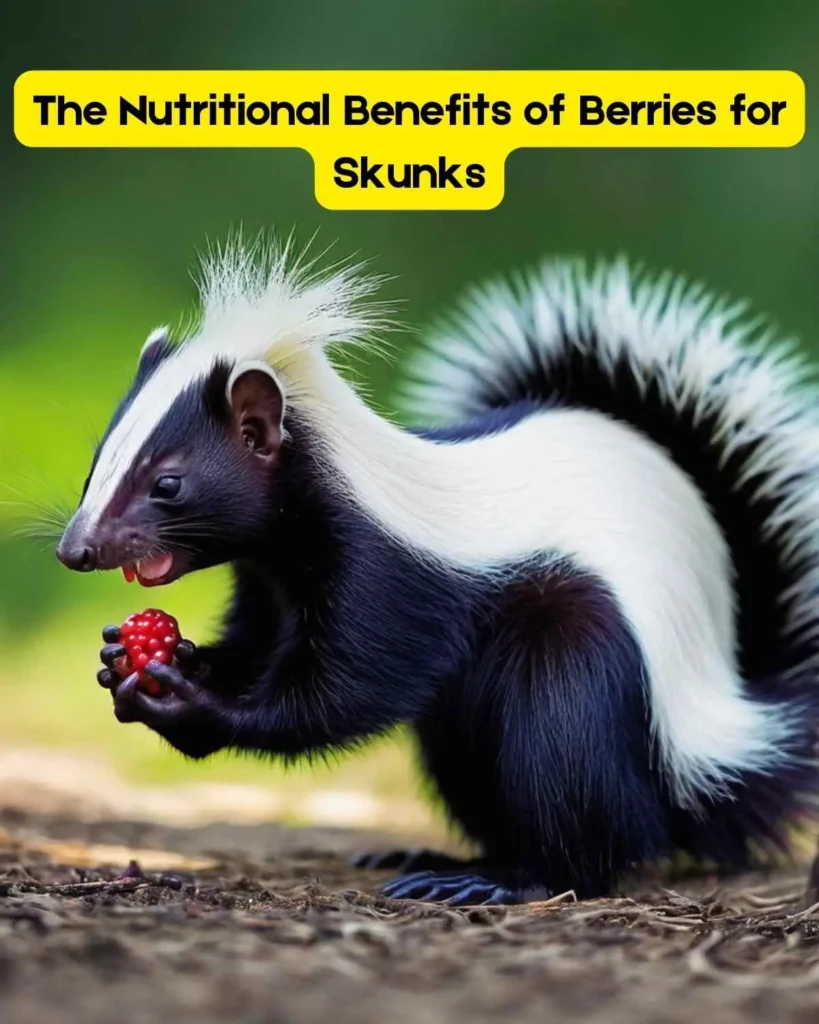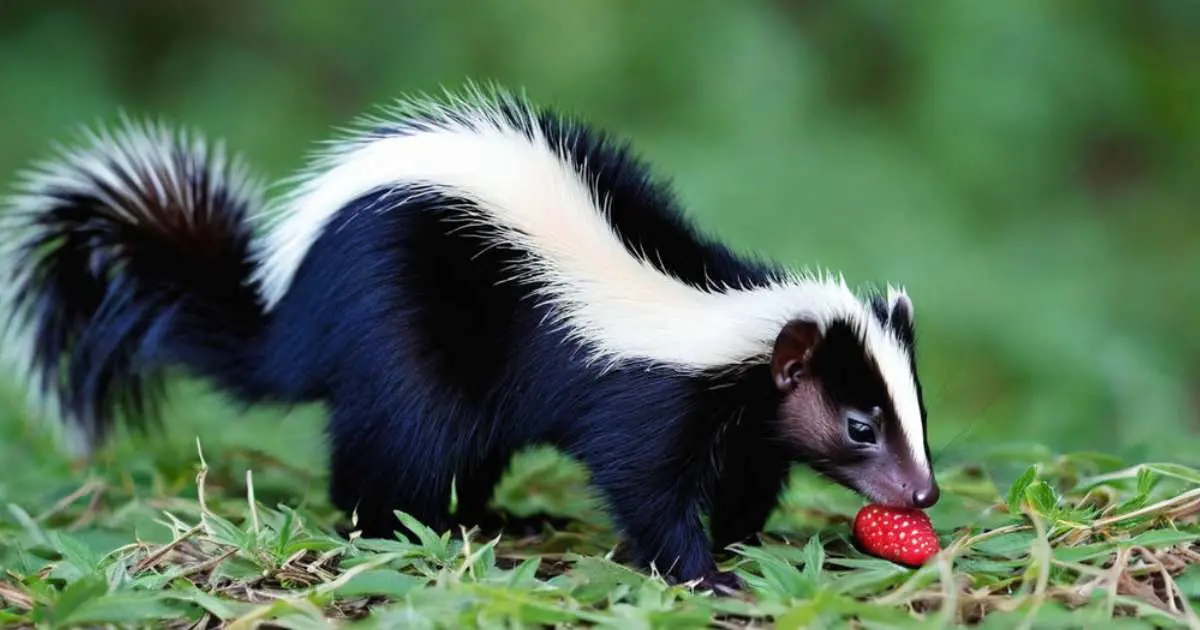Skunks and Their Berry Diet: A Sweet Connection
Last updated on August 11th, 2024 at 07:32 am
Through my experience as a skunk pet owner and wildlife researcher, I’ve learned that skunks have a surprising taste for berries. Yes, these furry foragers include berries in their diet, and it’s more important than you might think. Skunks not only enjoy these sweet treats but also help spread seeds, which is great for nature. Read on to discover more about these amazing creatures and their berry-eating habits.
The Skunk’s Diet: An Introduction
Imagine walking into a buffet where every dish appeals to you. That’s how skunks view the world when it comes to food. These little creatures have a diet that’s both intriguing and varied. Let’s dig into what skunks love to munch on, especially when it comes to berries and other sweet treats of nature.
Varied Tastes Of Skunks
Skunks are not picky eaters. They enjoy a wide range of foods found in their natural habitats. From crunchy insects to juicy berries, these animals take pleasure in the diverse flavors nature offers. Their diet changes with the seasons, making each day a new dining experience. Let’s look at the assortment they favor:
- Insects and grubs
- Small rodents
- Bird eggs
- Fruits and berries
- Nuts and plants
Nutritional Needs And Preferences
Skunks need a balanced diet to stay healthy. Like us, they look for meals that meet their nutritional needs. Berries are a favorite because they are not only sweet but also packed with vitamins. These treats offer skunks a boost of energy and essential nutrients. See what else composes their well-rounded diet:
| Food Type | Benefit |
|---|---|
| Protein | For muscle and health |
| Fats | For energy |
| Carbohydrates | For more energy |
| Vitamins & Minerals | For overall well-being |
Berry Consumption In Skunks
Think of skunks, and you can probably imagine their famous defensive spray. But did you know these critters have quite an appetite for berries? Indeed, skunks are not just pungent, they are opportunistic eaters with a sweet tooth for nature’s candies. Let’s dig into what types of berries these black and white creatures enjoy and their seasonal eating patterns.

Types Of Berries Skunks Eat
Skunks are not picky when it comes to their berry choices. Here’s a list of common berries these animals feast on:
- Raspberries – A skunk favorite.
- Blackberries – Found in thickets, a skunk’s haven.
- Blueberries – A nutritious treat for skunks.
- Strawberries – Often raided in gardens.
- Cherries – If low enough for skunks to reach.
Seasonal Eating Habits
Skunks adapt their diet to the seasons. Their berry consumption peaks when these fruits are most abundant. See the table below for a seasonal overview:
| Season | Berry-Eating Behavior |
|---|---|
| Spring | Berry buds and early bloomers. |
| Summer | Highest berry intake; many types are ripe. |
| Fall | Winding down as berries become scarce. |
| Winter | Minimal to no berry consumption; scarce availability. |
The Foraging Behavior Of Skunks
Imagine a skunk’s life, foraging for food through the forest floor. As dusk falls, these small, furry creatures begin their nightly hunt. Skunks have a diverse diet, yet many wonder if skunks eat berries. The answer lies in their adaptable foraging behavior.
Searching For Food
Efficient and opportunistic, skunks employ their sharp senses to find meals. They use smell and touch to locate food, often foraging by night to avoid predators.
- Skunks dig with their claws for insects and grubs.
- They turn over rocks and logs to uncover hidden treats.
- Berries become a sweet spot for their diverse palate during seasons of abundance.
Natural Habitats And Food Sources
Skunks thrive in various ecosystems, from woodlands to suburban areas. Their habitats dictate their diet. Berry bushes in the wild offer a rich food source for skunks.
Let’s explore skunk diets based on their habitats:
| Habitat | Common Food Sources | Inclusion of Berries? |
| Woodlands | Insects, small mammals, bird eggs | Yes, seasonally |
| Grasslands | Rodents, plants, larvae | Yes, if available |
| Urban/Suburban | Human waste, garden fruits | Yes, from gardens |
In each habitat, berries supplement skunks’ nutritional needs, particularly when other food sources are scarce.
Nutritional Value Of Berries For Skunks
Exploring the nutritional value of berries for skunks unveils a smorgasbord of tantalizing benefits. Skunks, with their diverse diet, often stumble upon berry patches. These colorful fruits are not just a sweet treat but a powerhouse of nutrition, crucial for the well-being of these nocturnal creatures.
Berries come packed with vitamins, minerals, and antioxidants. Vitamins such as C and K aid in skunk’s immune function. Minerals like magnesium and potassium support nerve and muscle health. Fiber in berries helps with digestion, an essential aspect of a skunk’s health.

Health Benefits From Berries
- Immune System Boost: Vitamin C in berries boosts the immune system.
- Healthier Digestion: Berries’ fiber ensures a healthy gut.
- Antioxidant Powerhouse: Antioxidant-rich berries protect cells.
Impact On Skunk’s Health And Growth
Berries influence skunk’s growth positively. They promote healthy bone development with vitamin K. Muscle function is supported by magnesium. Skunks’ overall growth benefits from the balanced nutrition offered by berries, making them an important part of a skunk’s diet.
Observing Skunk Behavior In The Wild
Skunks are known for their distinctive stripe and defensive spray, but have you ever wondered what these little creatures eat? Observing skunks in their natural habitat can give us fascinating insights into their diet and foraging habits. Let’s venture into the wild to watch these furry foragers in action and learn about their love for berries.
Case Studies: Skunks In Their Natural Environment
Researchers have observed skunks in various settings to understand their feeding patterns. Studies highlight that skunks do fancy a fruity snack. Here’s a glimpse:
- Skunks have been seen eating wild berries in forests.
- They often visit berry bushes at night in grasslands.
- Observations show skunks feasting on fallen berries in orchards.
These case studies reveal not just a preference for berries but also a flexible diet depending on what’s available.
Expert Opinions On Skunk Diets
Wildlife experts agree skunks are omnivores with a varied diet. Berries are a favorite among these items:
| Food Category | Examples |
| Fruits and Berries | Blackberries, blueberries, wild cherries |
| Small Animals | Insects, worms, small rodents |
| Plants | Grasses, leaves, buds |
| Human Waste | Garbage scraps, compost |
Experts stress that skunks are not picky and berries are part of their nutrient-rich diet. This helps them stay healthy and active in the wild.
Human-skunk Interactions And Feeding
Curious about your backyard buddies? Skunks often wander into human spaces. They might look for food, shelter, or just a place to rest. Sometimes these striped visitors find berries in gardens. Skunks do eat berries, along with other foods. But should we feed those cute creatures directly?
The Dos And Don’ts Of Feeding Skunks
Feeding skunks can be tricky. People want to help but it could cause harm. Let’s look at some important points:
- Do:
- Maintain a clean yard to avoid attracting skunks.
- Use sealed containers if you compost.
- Watch from a distance to appreciate their behavior.
- Don’t:
- Feed skunks by hand or leave out pet food.
- Approach or try to pet them.
- Forget they are wild animals with natural instincts.
Ethical Considerations Of Feeding Wild Animals
Feeding wildlife, like skunks, has ethical sides. We need to think before acting. Here are some points to ponder:
| Consideration | Impact |
| Dependency | Animals may rely on humans for food. |
| Health | Human food isn’t always healthy for animals. |
| Behavior | It may change how they interact with people. |
| Safety | People close to wild animals might get hurt. |
Remember, while feeding skunks may feel nice, it often isn’t best for them. Admire them from afar, and let them stay wild and free.
The Impact Of Seasonal Changes On Diet
Nature’s pantry doesn’t stick to just one menu, especially for creatures like skunks. An intricate dance between the seasons and skunk diets takes place throughout the year. The changing temperatures and weather conditions bring a shift in eating habits that is both fascinating and vital for their survival.
How Seasons Affect Food Availability
Food accessibility for skunks changes with the passing of each season. Summer and spring wear a cloak of abundance, while autumn shows a mixed bag of foraging opportunities. Winter, though, often tightens its grip, making food sparse.
- Berries and insects flourish in warm months.
- Fall offers a dwindling supply of juicy fruits.
- Winter forces skunk to scavenge for whatever food remains.
Adapting Diets: Skunks In Winter Vs. Summer
Like a skilled chef, a skunk must adapt its recipe for survival as seasons turn.
| Season | Diet in the Wild |
|---|---|
| Winter | Roots, nuts, and small mammals replace berries. |
| Summer | A banquet of berries, insects, and small rodents prevails. |
In summer, skunks feast on nature’s bounty. Berries, ripe and succulent, form a significant part of their diet.
Come winter, skunks pivot. The berry buffet ends. Their diet shifts to what’s buried beneath snow and ice or stored from warmer days.
Skunks In Captivity Vs. Wild: Dietary Differences
Do you know if skunks enjoy snacking on berries? The answer might depend on where they call home. Skunks in the wild have a varied diet, but those in captivity live differently. Let’s dig into the dietary differences between these friendly-striped creatures in captivity and their wild counterparts.
Feeding Skunks In Rehabilitation Centers
Rehabilitation centers for skunks often have a specific meal plan. This plan ensures that each skunk gets the right nutrients for health and recovery. Typically, these centers provide:
- High-quality commercial skunk food – to meet essential dietary needs.
- Various fruits – with a focus on berries to provide natural sugars and fiber.
- Veggies – for essential vitamins and minerals.
- Protein sources – like boiled eggs, insects, or cooked meat.
Lessons From Captivity To Understand Wild Diets
The feeding regimens in rehabilitation centers can offer insights into the natural diet of wild skunks. Observations indicate that wild skunks are opportunistic eaters. While berries are a tasty treat, skunks will forage for what’s readily available. They enjoy:
| Food Category | Examples |
|---|---|
| Plant-based Foods | Berries, nuts, leaves |
| Proteins | Insects, small rodents, eggs |
| Human-related Waste | Garbage, pet food |
Understanding captivity diets helps us appreciate the nutritional needs of skunks in the wild. It sheds light on their flexibility and resourcefulness in finding food.
Protecting Skunk Habitats For Natural Foraging
Protecting skunk habitats is essential for their survival and natural foraging behaviors. Skunks are known for their appetite for various foods, including an array of berries found in the wild. Ensuring these habitats remain safe and undisturbed allows skunks to partake in natural foraging, which is crucial for their health and the ecosystem.
Conservation Efforts For Skunk Habitats
Conservation efforts focus on preserving the natural areas where skunks live and forage. Activities include:
- Land protection to prevent habitat loss.
- Creating wildlife corridors allows safe travel.
- Supporting legal protection of skunk habitats.
- Educating the public about the importance of skunks in nature.
The Role Of Berries In Ecosystem Health
Berries play a key role in the health of ecosystems. They provide vital nutrition not only to skunks but also to other wildlife. Berries as a food source help maintain the balance of nature, and their presence indicates a healthy ecosystem. They contribute to:
- Supporting diverse wildlife diets.
- Acting as pollination agents when consumed and spread.
- Nourishing the soil through its decaying organic matter.
Frequently Asked Questions
Skunks favor a diverse diet, including insects, grubs, small rodents, fruits, and plants. They are omnivorous creatures known for their opportunistic feeding habits.
Yes, skunks do enjoy eating raspberries as part of their omnivorous diet. These fruits provide a natural food source for them in the wild.
Skunks should avoid chocolate, caffeinated beverages, alcohol, onions, garlic, and salty junk food. These foods can be toxic to them.
Conclusion
As we’ve explored, skunks indeed enjoy berries as part of their varied diet. They’ll often forage for these juicy treats, balancing their nutrition. For gardeners, this could mean safeguarding berry patches. For nature enthusiasts, it’s a glimpse into the diverse dietary habits of these nocturnal creatures.

